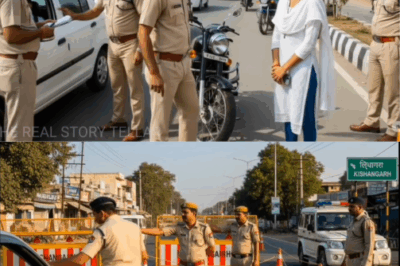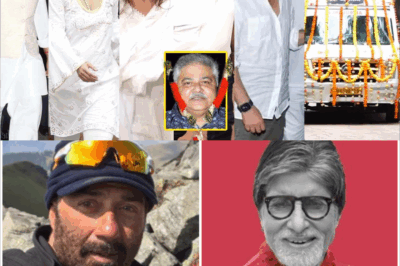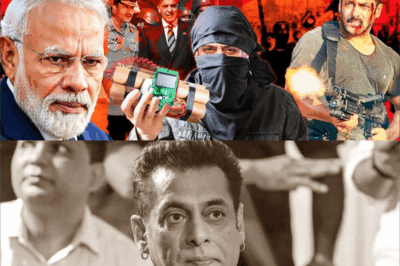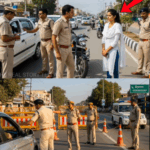Aishwarya Rai, Amitabh Bachchan, Abhishek reached together to pay their last respects to Piyush Pandey!
.
.
Aishwarya Rai, Amitabh Bachchan, and Abhishek Bachchan Unite to Pay Last Respects to Piyush Pandey: A Somber Farewell to India’s Creative Titan
Mumbai — In a poignant moment that captured the collective grief of India’s creative and entertainment fraternity, Aishwarya Rai Bachchan, Amitabh Bachchan, and Abhishek Bachchan arrived together to pay their last respects to Piyush Pandey, the legendary advertising icon whose ideas and voice shaped the nation’s cultural memory for over three decades. Their presence, solemn and understated, reflected the magnitude of the loss felt across generations who grew up with the stories, slogans, and songs Pandey helped bring to life.
Outside the venue, the atmosphere was heavy with emotion and reverence. Security cordons attempted to manage the growing crowd, while murmurs of “make way, please” and “side, side” echoed amid the hum of camera shutters and the soft shuffle of mourners. Background strains of devotional and instrumental music heightened the solemnity, punctuated by occasional moments of hushed conversation, calls for decorum, and appeals for calm as attendees moved through narrow passages to pay homage.
A Family’s Quiet Dignity, A Nation’s Shared Grief The Bachchan family’s arrival was a reminder of the quiet solidarity that binds the film and advertising worlds. Amitabh Bachchan—whose voice-overs, campaigns, and public service messages have often intersected with Piyush Pandey’s creative universe—stood composed, offering prayers alongside his son Abhishek and daughter-in-law Aishwarya Rai Bachchan. Their presence symbolized not just celebrity condolence but an acknowledgement of Pandey’s profound contributions to Indian storytelling, brand-building, and public messaging.
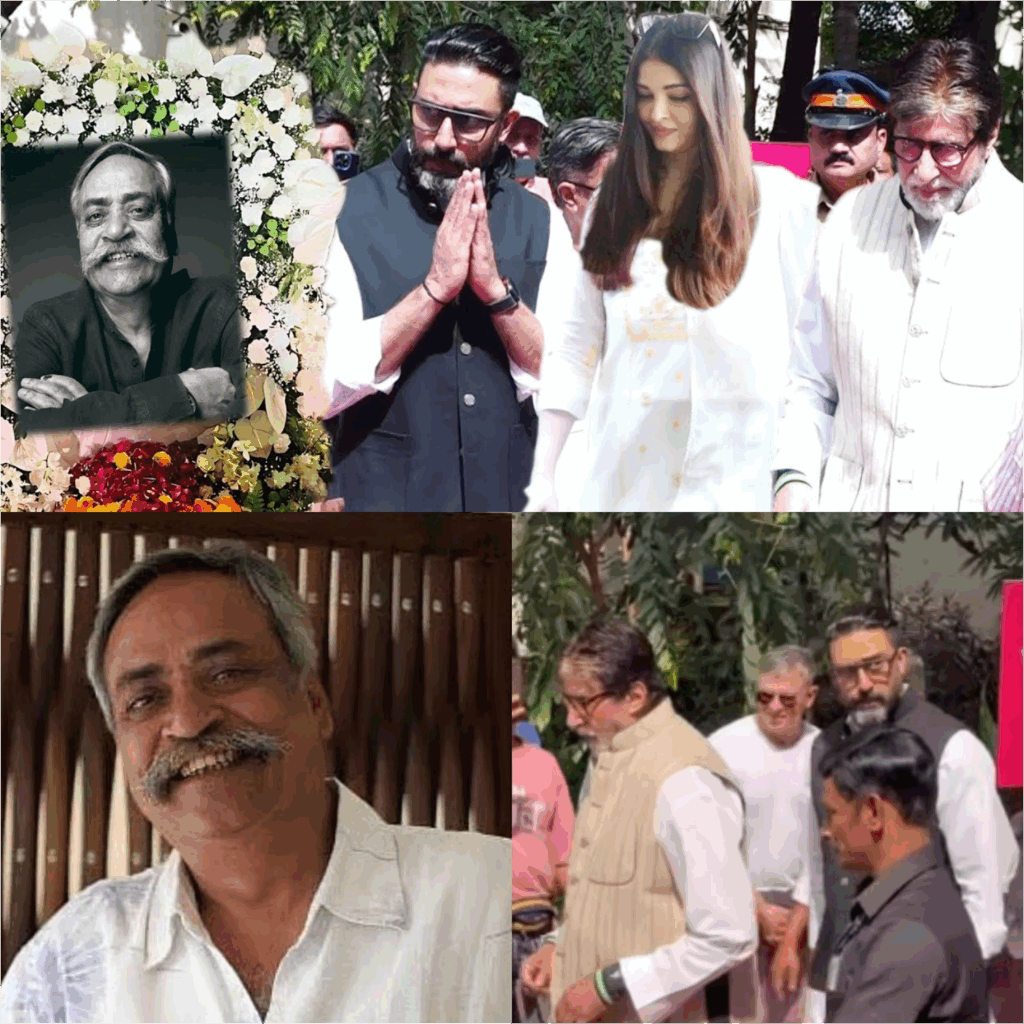
Onlookers remarked on the grace with which the family navigated the throng. “Please don’t push… go straight,” a coordinator urged, as the crush of media and mourners intensified. “It’s painful,” whispered one attendee, visibly moved by the solemnity of the moment and the emotional weight borne by those closest to the departed. The crowd’s spontaneous expressions—part prayer, part lament—captured a collective sense of loss: the feeling that an era of unmistakable voice, humor, and insight had come to a close.
The Legacy of Piyush Pandey: A Voice That Became India’s Inner Monologue Piyush Pandey’s name is synonymous with an India that learned to laugh, reflect, and aspire through advertising that felt more like cinema than commerce. He belonged to the rare league of copywriters and creative chiefs who transcended their domain and became cultural figures. His campaigns were catchy yet humane; they rang with colloquial authenticity, fused with lyricism, and often ended on a note that felt personal. From jingles that became playground chants to public service campaigns that shifted social norms, Pandey’s work rose above sales to touch sensibilities.
Friends and collaborators remember how he layered Indian identity—its languages, quirks, and everyday gestures—into work that spoke across class and region. His knack for casting, tonal control, and timing turned 30-second spots into miniature films. He excelled at finding the emotional heartbeat of a message, be it a festival greeting, a road safety reminder, or a brand confession. In an era when algorithms reward bombast, Pandey’s craft privileged clarity, warmth, and wit.
A Bridge Between Industries The turnout at his final rites was notable not just for the faces from advertising, media, and marketing, but also for luminaries from film, television, and sports. Many of India’s most recognizable on-screen stars owe indelible parts of their public personas to campaigns he shaped. It is no coincidence that actors as varied as Amitabh Bachchan and a new generation of performers found natural synergy in Pandey’s briefs—he gave them lines that felt lived-in, believable, and rooted in everyday Indian life.
Amitabh Bachchan, himself a towering voice in public messaging, has often been the face and tone of national campaigns—proof of how advertising can partner with cinema to elevate public discourse. Observers noted how the Bachchans, with measured steps and folded hands, embodied the cross-industry respect Pandey commanded. Aishwarya Rai Bachchan, a global cultural ambassador, and Abhishek Bachchan, with his own deep links to brand and film collaborations, rounded out a tableau of solidarity that spoke louder than any sound bite.
The Scene Outside: Crowds, Cameras, and Calls for Composure Outside the hall, the choreography was familiar but tense: media lines bending, microphones raised, camera rigs pivoting to catch a glimpse of arriving dignitaries. Amid the motion, hushed admonitions: “Not like this—please don’t push,” “Side, side,” and “Go straight.” The occasional flurry of movement—someone ducking through a gap, a security member urging patience—triggered murmurs and sighs. “It’s hurting,” a soft lament carried through the air, reflecting both the physical press of the crowd and the deeper ache of parting.
Interludes of music—somber, almost cinematic—floated above the chatter, as if to guide the crowd back to reflection. In those moments, people adjusted their posture, lowered their voices, and let silence take over. The solemnity was punctuated by brief announcements about queue order, requests to give space to elderly mourners, and appeals to let the family pass without disturbance.
Tributes from the Fraternity Even before the ceremony, tributes to Piyush Pandey had flooded social media timelines. Industry peers lauded his mentorship, his insistence on craft, and his deep belief that Indian stories deserve Indian rhythms. Clients recalled how he pushed for authenticity over artifice; young copywriters described the thrill of a hallway nod or a scribbled note from him on a proof. Several agency leaders promised scholarships and creative labs in his name to support aspirants from small towns—an ethos Pandey championed throughout his career.
Directors and cinematographers who worked on his campaigns remembered his collaborative rigor: long table reads, location recce debates, and storyboards that morphed into living moments on set. Musicians and voice artists recalled how he treated a jingle like a chorus of a nation, not just a hook for a product. “He treated 20 seconds like a short film,” one composer said. “Every beat mattered.”
A Cultural Compass in a Noisy Age Pandey’s method—simple words, precise emotion, a twist of humor—stood out in a media universe that often confuses loudness for reach. He argued that the best writing respects the listener’s intelligence. He favored colloquial turns of phrase, rooted in the vernacular, that carried emotional clarity. That sensibility fostered trust: campaigns felt less like persuasion and more like conversation. In times of social churn, his public service messages—on health, civic duty, and mutual respect—cut through cynicism with dignity.
His influence also extended to how brands behaved in moments of national crisis or celebration. He understood that timing and tone could turn a campaign into a civic gesture. That instinct won him credibility with audiences who rarely extend it to advertising. The net effect: a redefinition of advertising as soft power—able to inspire, unite, and sometimes heal.
The Bachchans’ Gesture: Presence as a Statement The Bachchan family’s collective appearance conveyed a simple, resonant message: that culture is a continuum, and its custodians stand together in loss. Amitabh Bachchan’s history with national campaigns, Abhishek Bachchan’s steady body of work across mediums, and Aishwarya Rai Bachchan’s global associations with India’s image-making—together, they formed a quiet tribute to a man who helped articulate the vocabulary of Indian modernity.
No speeches were made. None were necessary. Their folded hands and lowered gazes—mirrored by hundreds around them—offered the dignity of presence. For a public used to sound bites, the restraint felt like an extension of Pandey’s own craft ethos: to say only what must be said, and to mean it.
The Human Pulse at the Periphery Every farewell has its intimate circle and its wider orbit. On the periphery stood junior agency staffers, students of communication, freelance creatives, and fans—people who discovered their calling in a line he wrote or a film he shaped. Some clutched flowers; others held notebooks, as if proximity alone might yield one last lesson. The murmured “look, look” gave way to respectful silence as the cortege moved. A few tears, a few private prayers, many bowed heads.
In the hours that followed, people lingered—exchanging stories, swapping favorite lines, replaying the arc of a career that taught a nation to listen. The mood shifted from raw grief to remembrance. It’s a familiar pivot at Indian farewells: sorrow tempered by gratitude, the heaviness lightened by shared recollection.
What Remains In the end, legacies in creative arts are measured by durability in public memory. Piyush Pandey leaves behind a living archive: phrases that endure in everyday speech, jingles that animate festivals, public messages that continue to influence behavior. He also leaves a blueprint for practice—mentorship as method, empathy as strategy, and language as a bridge, not a barrier.
As the Bachchans departed—escorted gently through the crowd—calls of “give space, please” and “side, side” rose again. The music swelled softly. The lines thinned. Dusk gathered. And with it, a quiet resolution among those who remained: to carry forward a standard of craft defined not by volume but by voice, not by spectacle but by soul.
A Nation Says Thank You India’s creative community, and the audiences it serves, owes Piyush Pandey an uncommon debt. He showed that persuasion could be poetic, that selling could be sincere, and that the shortest stories can be the ones that last longest. The sight of Aishwarya Rai, Amitabh Bachchan, and Abhishek Bachchan arriving together to honor him distilled that gratitude into a single image—stars saluting a star-maker.
Goodbyes often feel inadequate. But in the hush that followed the final prayers, one could sense a promise taking shape: that future campaigns will strive to be kinder, keener, truer—that they will respect the intelligence and feelings of those who watch and listen. It is a fitting tribute to a man who taught India to hear itself more clearly.
As mourners dispersed into the Mumbai evening, the city’s neon glow returned, and with it the everyday cadence of life and commerce that Pandey narrated so well. Somewhere, a jingle hummed under the breath of a passerby. Somewhere, a young writer drafted a line, crossed it out, and tried again. And somewhere, in the quiet pride of a nation that recognizes its storytellers, a simple farewell lingered: Thank you, Piyush. Go well.
.
News
DM अधिकारी साधारण लड़की के रूप में अपनी बाइक से जा रही थी तो कुछ पुलिस वालों ने बतमीजी की फिर जो हुआ
DM अधिकारी साधारण लड़की के रूप में अपनी बाइक से जा रही थी तो कुछ पुलिस वालों ने बतमीजी की…
जिसे साधारण पति समझकर घर छोड़ी… लेकिन 5 दिन बाद जब पता चला कि लड़का करोड़पति है, फिर जो हुआ….
जिसे साधारण पति समझकर घर छोड़ी… लेकिन 5 दिन बाद जब पता चला कि लड़का करोड़पति है, फिर जो हुआ…….
गरीब चायवाला समझकर मैनेजर ने किया अपमान… अगले दिन निकला कंपनी का मालिक! 😱 उसके बाद जो हुआ
गरीब चायवाला समझकर मैनेजर ने किया अपमान… अगले दिन निकला कंपनी का मालिक! 😱 उसके बाद जो हुआ . ….
Ajay Devgan Crying On Singham Actress Kajal Aggarwal Face Condition After Accident
Ajay Devgan Crying On Singham Actress Kajal Aggarwal Face Condition After Accident . . “Her Eyes Still Hold Courage”: Ajay…
Sunny Deol, Amitabh Bachchan, Kajol Devgan, Poonam Johny attended Satish Shah’s prayer meet together
Sunny Deol, Amitabh Bachchan, Kajol Devgan, Poonam Johny attended Satish Shah’s prayer meet together . . A Night of Remembrance:…
सलमान खान को पाकिस्तान ने आतं की घोषित किया? ! Pakistan On Salman Khan ! Salman Khan News
सलमान खान को पाकिस्तान ने आतं की घोषित किया? ! Pakistan On Salman Khan ! Salman Khan News . ….
End of content
No more pages to load

